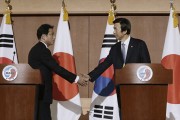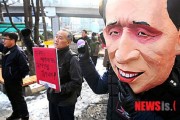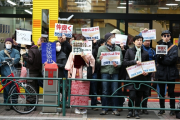It is not redundant to emphasize that snapshots of Korean netizens shown on koreaBANG by no means represent Korean netizens as a whole, let alone Korean people. koreaBANG is trying to show diverse opinions that exist on various Korean websites with distinct community cultures. MLB Park is one of the most active online baseball fan communities in Korea where current affairs are also vigorously discussed in a generally mature manner.
Recently, photos of a young woman [allegedly a high school girl then] protesting against the government’s multiculturalism policies in front of the National Assembly last year drew fresh attention and ignited heated debates over multiculturalism issues in Korea.
From MLB Park:
A high school student protests against multiculturalism
I oppose the multiculturalism policy that turns Korea into a multi-ethnic/racial country. Please listen to people’s diverse opinions about the current policy for foreign workers and marriage immigrants.
1. Foreign workers should not be considered substitutes to do 3D jobs quietly for picky Koreans. 3D industry’s lack of Korean workforce should be solved by improving wage and labor conditions instead of importing foreign labor. Because foreign workers remit most of their salaries to their home countries, they do not contribute much to domestic consumption and it interferes with improvement of working conditions and minimum wage. Foreign workers are willing to work in Korea because their salary is considered high due to the currency rate. The same wage is high for foreign workers while low for domestic workers. If you promote multiculturalism for them and even support illegal aliens’ children’s education and living, that only encourages foreign workers and illegal aliens to stay permanently in Korea. The government should encourage our citizens who are accused of seeking only comfortable jobs to engage in 3D industry with proper labor conditions and wages. If we only depend on foreign labor, our labor market and economy is disturbed. Please consider and protect our citizens first.
2. Currently, 89% of the marriage immigrants are female and many of them find their partners through marriage brokers. Due to the limitations of such coupling, they are prone to marrying only for acquiring citizenship, running away from home, domestic abuse, cultural difficulties, high divorce rate, etc. Brokered marriages should not be supported as they have characteristics of human trafficking. Of course, it is desirable to help them adapt to Korea by offering education courses but financial aid for them is reverse-discrimination against native households. If you promote brokered marriage instead of ‘natural’ marriage, it only adds to social costs. In addition, marriage immigrants in Korea have a duty to raise their children as ‘Korean’ and giving them privileges under the special category of multiculturalism only provokes native citizens’ ill feelings.
We may not be one ethnicity but we have kept one common culture. Please be more considerate if you plan a multicultural society in Korea that was not founded by immigrants.
Comments from MLB Park:
dr.레인:
At least, that is not just one-sided prejudice but an argument worth considering. Such concerns should’ve been raised before it all began…
wpqwpq12:
There are already more than a million [1.4 millions as of January 2012] foreign residents in Korea. Multiculturalism is likely to become a main issue in the next presidential election. I hope Ilbe fellas don’t commit any hate crime.
오지랖조선:
The welfare system has to help the troubled people in general. Putting multicultural families under special attention is discriminatory. This is so wrong.
GoGo:
Aren’t they talking about reverse-discrimination just because they haven’t really given much thought about why the government supports multicultural families? Because the ideology of homogenous ethnicity and culture and the tendency to look down on other colored people are still remaining, many multicultural children face difficulties. If they fail to adapt to Korean society successfully, it can grow into a bigger social problem. Things are much harder for immigrants because they do not speak Korean well. Without support for these socially vulnerable people, they cannot stand on their own feet properly.
Why do we promote welfare? To install the social safety net for the socially deprived. We don’t say it’s discriminatory when they get governmental aids. However, the high school student called it reverse-discrimination to support the socially deprived multicultural families. Of course, it is reasonable to claim the current system should be adjusted so that not all multicultural families, rich or poor, get the benefits. But if you say there should be no special support for them at all, that’s not different from saying we should abolish welfare altogether.
She doesn’t understand why the government is caring about the multiculturalism policies. Marriage immigration is a reality we cannot avoid. Since the sex ratio for the 20s and 30s was disturbed, about 10% of males in that age bracket should either marry foreigners or stay single. Is she telling them to be single for the rest of their life? She can’t see the big picture.
Also, legitimate foreign workers and illegal aliens should be distinguished but there are many who mix them together. Legal foreign workers are allowed to work for the designated companies under the governmental permission and strict control for a limited period of time. On the other hand, illegal aliens are just illegal and create the negative image for other legitimate foreigners. They should not work and it’s also illegal to hire them. Since legal foreign workers work only in the fields selected by the government, they aren’t really wage-competing with Korean workers in general.
라라라랄라:
Apart from everything else, it is true that marriage immigrants need more support than Korean couples. We have to help their children grow well in Korea. If we fail in this, we will have to spend even more money for future social problems than current subsidies. As for illegal aliens, although they should be strictly dealt with, they are cut slack in favor of the companies.
꿈의야구:
The student seems to think the government is encouraging multiculturalism. Multiculturalism is already a tide of the time. There are many multicultural households and they have problems. The government is not promoting multiculturalism but trying to help them adapt and reduce their problems. It is not right to think multicultural policies are at the expense of other citizens. Of course, it’s reasonable to claim the current system is flawed and needs to be fixed but it is nonsensical to claim native citizens are disadvantaged.
귓방망이:
It is wrong to take any criticism against multiculturalism policies as opposition to multiculturalism. Some things should be improved. Sometimes some people think they have to support the minorities in everything to be righteous.
사뇰:
Foreign workers including English teachers are just foreigners making money in Korea. Illegal aliens are criminals that should be kicked out. Marrying a foreigner is marrying a foreigner. I don’t know why we have to promote multiculturalism. If Koreans marry Japanese women or American men and live in Korea, that is nothing special. If they live in Korea, they become Korean. If they live in Japan or America, they will have Japanese or American identity. If it is because of the people from poor countries like Vietnam and the Philippines, isn’t it just enough to treat them like other poor Koreans and help them? Why do we need to go for multiculturalism? We can help them assimilate to become Korean but I don’t see the reason for multiculturalism.
GoGo:
When they say multiculturalism in the UK, France and Germany has failed, is it really relevant to our situation? The UK and France were not made of a homogeneous ethnicity like us. They were already comprised of multiple European ethnicities before a large number of colored people moved to those countries. Celtic, Roman-Latin, Anglo Saxon, Nordic, etc. people constituted the UK but they shared a common culture of Christianity in a broad sense and developed the monarchy shaping their culture and identity.
Now why do some say their multiculturalism has failed? Because Islamic immigrants’ culture isn’t mixing well with the native civilization derived from Christianity. It is a different matter from whether to simply accept foreigners. Foreigners have always existed there. What I’m getting at is that multicultural conflicts in Europe do not mainly come from racial issues.
Let’s look at Korea. Korea isn’t ruled by any one religion. Christianity, Confucianism, Buddhism and Shamanism have their own stakes in Korea. Why are we even comparing us to Europe’s situation? Do our new multicultural families cause any cultural conflict?
If it is religious and cultural conflicts that interfere with multiculturalism in Europe, it is ethnic nationalism and racism in Korea. It is very unconvincing to take Europe’s case to cast a cloud over Korea’s situation.
(ιº o º)! [in response to GoGo]:
It is at least necessary to be cautious because many countries tried multiculturalism but most of them failed. Our current multiculturalism policies are too short-sighted and hasty. Have we ever had serious research or debate on this? I guess not? I’m saying either quick opposition or implementation of policies is problematic. I agree with the high school student’s argument to a good degree. Korea is a country smaller than you think. Many side effects can happen in this small land. Multiculturalism is something you cannot retract once it’s started. Therefore, we need to contemplate and analyze this thoroughly. The current policies are clearly short-sighted and half-baked. Was there any public policy debate on this? Also, you call multiculturalism dissenters racist or purist and that is very unpleasant. Korea already has enough regionalism. Aren’t you too confident that multiculturalism will successfully put down roots in this country? I hope you stop branding dissenters as racist.
M.Anthony [in response to (ιº o º)!]:
Just because we still have regionalism, do you mean problems with multicultural families don’t need to be dealt with? You need to distinguish foreign workers, illegal aliens and multicultural families. Multicultural families are Korean. Multiculturalism policies are there to help those who look different settle properly in Korea.
(ιº o º)! [in response to M.Anthony]:
Idealism doesn’t solve the problem. The reality is that foreign brides are regarded as foreigners and multiculturalism policies encourage and increase the number of multicultural families. As their number increases, conflicts caused by them inevitably become a social problem. I hope you properly understand my comments before criticizing them. Because multiculturalism caused numerous failures in other countries, even if our situation is different, I’m just saying we should do thorough research and carefully implement it. In this small country that can’t even resolve regionalism, if multiculturalism becomes an issue, social burden becomes too heavy. Not that multiculturalism will definitely become a problem. Public opinion is largely divided on multiculturalism. If you go around labelling dissenters as racist, do you think it will help the situation? I said our current multiculturalism is clearly short-sighted and hasty. Don’t you also have to try to understand the dissenters? Do you think they are just simply racist?
쿠니미_히로:
National labor market control has nothing to do with racism whatsoever. Does the US or Japan accept any foreign workers? No. Discrimination against naturalized Koreans and controlling foreign labor are two completely different matters. If you call it all racism, you are not being progressive but almost fascist. “If you don’t agree with me, you are a commie.” Just replace ‘commie’ with ‘racist’.
GoGo:
When you criticize a group of people, you have to be careful. You need to be extra careful to not indulge in baseless contempt. There are definitely problems caused by illegal aliens and there should be effort to curb them. However, deflecting complaints about illegal aliens to legal foreign workers is a problem and we have to care whether such sentiments may hurt naturalized Koreans. Someone above complained about my racist-labelling. Okay, I apologize if you felt unpleasant. But also, try to see how much effort you have put to refrain from such name-calling yourself. Whether foreign workers, illegal aliens and multicultural families were lumped together. Why am I saying this? The multiculturalism campaign isn’t for foreign workers. It is to protect the multicultural children from discrimination and help them grow as proud Korean citizens with equal opportunities. We are trying to raise awareness. Are you even trying to interfere with such effort because it may also help foreign workers? Would you neglect the children? Are they foreigners? Are they the same as foreign workers after all just because their mothers came from far-away lands? No matter how hard they try, if they look different, they can’t be Korean? Isn’t this labelling-by-association? If you felt so insulted by some anonymous comments on the Internet, have you ever thought about those who might have been insulted in real life? Don’t you want to ponder about how to improve this situation?
2dog1cat:
The student’s argument is bullshit that just sounds specious. She is just reiterating the neo-Nazi skinheads’ rhetoric without shaving her hair. I hope she gets a 3D job that foreign workers are doing with low wages. (Since those jobs can only work with poor conditions and low wages, if foreign workers stop working, the industry will just disappear.) I also hope she finds a 40-year-old man in the countryside and marries him.
(ιº o º)! [in response to GoGo]:
Of course, we should support the existing multicultural kids that you sir talk about, but the problem is that the current policy is even encouraging multiculturalism. They give incentives to multicultural homes. It is different from just supporting the kids. Native citizens can be discriminated against by the current policy. I’m just saying this needs to be corrected. This is not right. It is okay if the number of multicultural families increase naturally but it is wrong to offer privileges and artificially increase them with our tax money. It is dangerous to denounce this criticism as racism. Since when has Korea been a global race showroom to even promote this type of policy? Mentioning skinheads and stuff is really thoughtless. Some people are using words like ‘bullshit’. It’s a slur. Since when has this site allowed it?
의지의승리:
Her argument is not the same as the neo-Nazi’s rhetoric and not even extreme. If we kick out illegal alien American or European, nobody would scream racism. When we kick out illegal alien South East Asians or South Asians, it’s funny that some people bring up racism, KKK and all that jazz foaming at the mouth.
리겔:
Discrimination against our citizens does exist. A while ago, a famous Japanese blogger Sayaka living in Korea (who married a Korean man) revealed that she refused to accept child care subsidies from the Korean government. She was concerned that even affluent multicultural families receive subsidies when the money should be spent for other families with real difficulties. That is clearly reverse-discrimination. I’m not against foreigners living in Korea. I support the system that helps multicultural kids with financial or cultural difficulties. However, it doesn’t make sense to give money out just because one of the spouses is from a foreign country.
shalling [in response to 리겔]:
You are right except that multicultural families are also our fellow citizens. Lee Jae-yong [Samsung Electronics’ chairman’s son]’s son is our fellow citizen and multicultural families are our fellow citizens, too.
당근매니아:
We should first consider whether illegal residency should be blamed not only on individual illegal aliens but also on our labor system. What solution can you get if you don’t touch the cause and system? Personally, it’s embarrassing that this community is considered to be on the left side of the political fence, with this level of discourse. Reading the girl’s poster pisses me off again. I don’t even want to define myself as Korean and live like that. “A duty to raise their children as Korean”? What bullshit -_-; Concepts like ‘national character’ and ‘homogeneous culture’ are groundless myths in the first place. To be fair, I’m asking too much when even regionalism hasn’t been resolved yet.
커피프레스:
Realistically, there are difficulties for multicultural families to adapt to Korean society and the policy is to help make a soft landing to the social transformation. You can call it reverse-discrimination in some way but all kinds of welfare policies can be called so. Selective welfare becomes discriminatory to non-recipients and universal welfare gives unappreciated benefits to rich people. It’s a matter of degree. There is no definite answer that makes everyone happy. I checked the MOGEF‘s housing policy for multicultural households. It looks like legitimate welfare, not reverse-discrimination.
완전연소:
The fact that a mere high school student can write an argument like that and go out to the street to assert it makes me realize how nationalism can anaesthetize human senses and impose delusions.
사뇰 [In response to 당근매니아]:
To whom on earth is it embarrassing? To all the other non-existing countries in the world where couples with foreign spouses get subsidies? To Germany and France where national leaders declared multiculturalism has failed? Or to some imaginary country where multiculturalism is ideally implemented? “I don’t even want to define myself as Korean and live like that.” Did you put that part to sound more convincing? Do you think your twisted thoughts are common? It doesn’t seem like there are many Koreans who despise being Korean and I don’t think such people’s opinion really matters. Opinions of foreigners who care about Korea would be more beneficial.
당근매니아 [In response to 사뇰]:
Cheers to your extremism that interprets “I don’t want to be confined in the frame of being Korean” as “I despise being Korean”.
Blue-Blood:
It is true that the student said bullshit. She regards illegal aliens, foreign workers and multicultural families altogether. She calls for protecting our own citizens but that multicultural people are not our own citizens is a wrong premise to begin with. If you think the welfare system gives out too much, you just need to adjust it. Opposing it completely doesn’t make sense. We don’t even need this long thread of arguments. Man-made policies are not 100% perfect and most people take advantage of the flaws. It’s like just because there are some completely able-bodied or slightly injured people who received money for the disabled, she wants to abolish the entire benefits for the disabled.
세월의흐름:
Naturalized Koreans and foreign workers are our friends. Native Koreans are our families. It is narrow-minded to think nationalism is bound to turn hostile, always bringing up the Nazi Germany’s example. Benevolent nationalism is also possible. Even if we love our families with a sense of unity, it doesn’t mean we ignore or look down on our friends.
당근매니아:
I just don’t like it when they define humans primarily by nation or ethnicity. My nationality is Korean. I’m a mongoloid. I speak Korean. I support social democracy. I have no religion. I value the scientific way of thinking. I like elegant proses. I do not understand why my nationality should come before the other characteristics that define me and I don’t know what ‘Korean’ as in ‘a duty to raise their children as Korean’ exactly means. Is it enough if I speak Korean well, like Kimchi and celebrate Korean national holidays? Things like nationality and cultural membership are not something absolute. Why would you religiously value it? If you insist I’m supposed to share common human traits with other Koreans just because of my nationality tag, isn’t that just nationalism?
너는두부공 [In response to 당근매니아]:
I do respect your personal opinion. Genetic traits of Korean people clearly exist. It is completely your own freedom to ignore such things and if someone criticizes you for that, it is them who are stupid. However, if you think your perspective makes you more ethical or humane, it is another matter. These days, charity events or commercials to help African children are a trend. The catchy phrase is that 10k won can save three starving minors. It’s interesting. Let’s say average Koreans make 1.5 million won monthly. If only 1/10 of 50 million Koreans donate 1/5 of their incomes (it’s a matter of human lives!), we can save 120 million African children a year. However, no people or organizations have ever done something of that scale while millions of them have died for decades.
We live for ourselves and you can’t criticize that. Do Korea’s prominent left-wing intellectuals such as Park No-ja [Russian-born naturalized Korean scholar famous for social critiques] or Chin Jung-kwon participate in such donations? If they donate half of their monthly income right now, that can prolong hundreds of children’s lives. That’s interesting. They always talk about love for humanity in words but Park left for Norway for a better job and Chin complains about living expenses to his wife.
If you are uncomfortable with labelling identity, why don’t you look at the tide of multiculturalism in reality as social class struggle? Would that make you feel comfortable? ^^ People formed a group and eventually a nation to protect themselves against economic struggles and outsiders’ plundering. After spending thousands of years in such frame, they ended up sharing common genetic, linguistic and cultural traits. In modern times, they defined citizenship in the West and ethnic identity in the East, depending on their historical and spacial characteristics. In this 21st century, there may be people who are uncomfortable with such labels. However, that doesn’t make them more ethical or humane. (Consider all the historical figures who sacrificed themselves for other people…) Today’s multiculturalism is an issue that is clearly differed by social class. If you want to talk more about this, I’m open to it. ^^
당근매니아 [in response to 너는두부공]:
1. I’m puzzled at the idea that genetic characteristics and phenotypes that define Korean people exist in reality. Within Korea, Southern and Northern phenotypes co-exist and the Mongolian conquest, Japanese occupation, etc. made it very hard to distinguish Chinese, Koreans and Japanese in terms of phenotypes. The range of phenotype variations within Korea are much bigger than the difference between the averaged Korean and Japanese phenotypes.
2. I don’t think my stance is particularly ethical or humane. This is a value-neutral matter and I refuse to drag that into the realm of values. Me as an individual is more convincing than me as a Korean to define myself.
3. Your example reminds me of the gold-collecting campaign [after the IMF bailout in 1997]. Replacing the national or social system’s burden with each individual’s responsibility makes it look straightforward for now. Numerous people still lose their lives because of parasites and diseases caused by them in the Third World. However, the research budget allocated for them is an extremely small portion of that for hair loss treatment in the world. You can’t rely on individual responsibility to deal with such problems.I regard the relationship between the nation and the individual as a contract. The nation has a duty to build social and physical safety net for which I pay taxes. When you don’t see this relationship mutually responsible, it may become nationalism. It seems this society doesn’t really seem to acknowledge mutual responsibility.
“I with my body and soul solemnly pledge allegiance for eternal glory of the motherland and people.” [‘The Pledge of Allegiance to the Flag‘ before the revision in 2007.]










